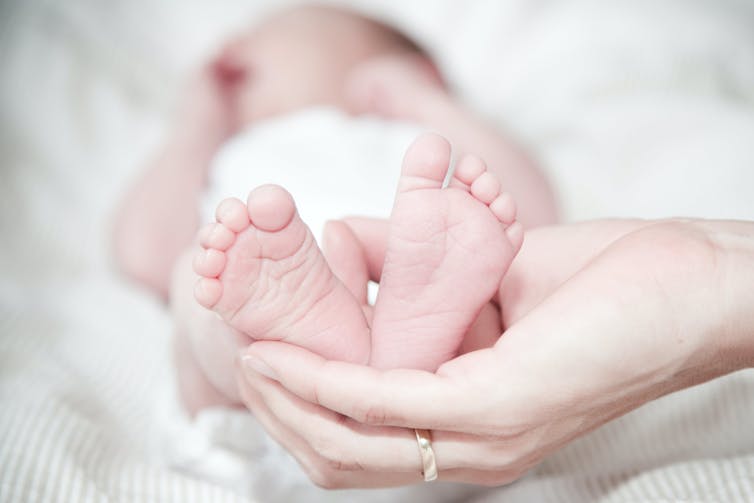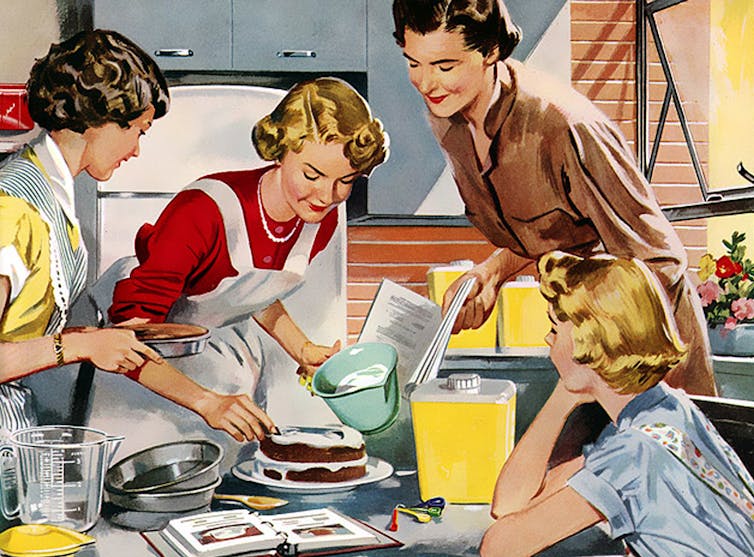There is a seductive simplicity to the “tradwife” trend, with its filtered representations of domestic bliss – from homesteading to homeschooling, home baking to homemaking.
Tradwife is internet shorthand for “traditional wife”. While tradwives emerge across the political spectrum, a small subculture use their platforms to promote the dark ideas of the far right. They operate across social media platforms, prominent on X (formerly Twitter), TikTok and Instagram. For some, the lifestyle seems driven by social media, but for others, it’s a way of living.
The number of tradwives aligned with the far right may be small, but their popularity on social media platforms suggests their cohort is growing. And we know from our research that far-right tradwives are active in Australia, on places such as X and Tik Tok, Instagram and YouTube.
In 2020, UK-based extremism researcher Julia Ebner suggested 30,000 women identified as tradwives or Red Pill Women: women aligned with the far-right male online community Red Pill, who claim to be “awakened” to “male subjugation by feminism”.
Journalist Sian Norris, who has investigated the British far right, wrote this year that while most of these women are in the US, “due to the networked nature of the modern far right”, trends that start there spread around the world.
Far-right tradwives believe contemporary society is beset by decadence and consumerism, sexual depravity and promiscuity, and “unnatural” ways of living. This is all supposedly engineered to weaken the white race. Becoming a tradwife is one way far-right women push back against these supposed threats.
Ebner believes “the search for love is what radicalises most Trad Wives”: they adopt the rhetoric of men’s rights activists who want “a return to traditional power roles and exaggerated notions of masculinity and femininity”.
Our research shows far-right tradwives believe their roles as mothers and wives guarantee the survival of the white race, while actively weakening enemies. In an effort to encourage men to the cause, some tradwives claim they embraced their “true” femininity only after they were protected by a “real man” who embodies the (toxic) masculine ideals of the far right.
The exploitation of “traditional” gender identities to promote far-right ideas is dangerous. It makes women’s subordination to men seem legitimate – and even natural – and justifies violence when this natural order is disrupted.
Read more: Right-wing extremism has a long history in Australia
‘Submitting’
The tradwife is not a new phenomenon. In recent years, the identity has been adopted by women preferring domestic duties over the modern workforce. The tradwife aesthetic is soft, feminine and sometimes political. Not all tradwives are far-right – and of course, women have every right to choose the lifestyle that best suits them.
Tradwives across the political spectrum believe the place of women is in the home: as wives and mothers. They justify this through political or religious beliefs, or their own personal choices. Many argue they are returning to a traditional way of living that has become unconventional in a society that expects women to be part of the workforce.
For example, tradwife influencer Estee Williams, who has more than 134,000 followers on TikTok, includes submitting to her husband, no opposite-sex friendships and letting her husband have the final say on their finances in her advice for a successful marriage.
One Australian tradwife influencer with a substantial TikTok following (also active on X) similarly exalts submitting to her husband.
Tradwives and the far right
The far right has long had a girl problem. Far-right men (and women) discuss the ideal roles and behaviours of women almost to excess.
For instance, they describe the “good woman” as demure, well-behaved, quietly intelligent – and although incapable of leadership, key to the future of white people. These women are “wounded by the lie of equality, but not broken by it”.
The tradwife is one celebrated form of women’s identity in the far right, weaponised to promote racially focused ideas.
The far right centralises women’s value as one of service. This means serving as a wife by caring for – and bearing children for – their husband, and serving children by being a mother. Through those two efforts, they serve – and indeed continue – their imagined racial and cultural heritage.
Far-right ideology has emotional appeal beyond racial concerns, too. Its ideology and structure provides certainty in times of chaos, order in times of disorder, and meaning in times of existential struggle.

For far-right tradwives, ideology provides gendered clarity by mandating how they should behave, dress, live and interact with others. Their roles as wives and mothers are celebrated as a pure, authentic form of white womanhood. The far-right believe tradwives should be the norm – not an exception.
In an era of #girlboss and hustle culture, tradwives feel judged for their lifestyle choices. Ironically, though, many manage carefully curated, sometimes monetised social media followings. (Some even sell social media advice to followers.)
Far-right tradwives argue the insatiable demands of the capitalism system and feminism are complicit in an all-out war on womanhood.
One prominent far-right tradwife claims feminist domination has resulted in the repression of men who are tired of being shamed for their masculinity.
Read more: 'Toxic masculinity': what does it mean, where did it come from – and is the term useful or harmful?
Those who do not conform to the feminine ideal are seen as unnatural, racial traitors or enemies. Some far-right tradwives use their social media platforms to attack the LGBTQIA+ community for not adhering to heterosexual norms, as well as feminists and victims of domestic violence.
For instance, in response to the claimed fall in white births, which she attributes to female “traitors”, one tradwife infamously called for the “white baby challenge”. “I’ve made six!” she wrote. “Match or beat me!” She is not an exception.

Others use their platforms to denounce measures that aim to promote equality – one made a widely viewed video in which she said “I blame feminism” for welcoming attitudes to refugees.
The political actions of these far-right women are carefully positioned as “protective and instinctual”, rather than “power-seeking”.
Through the tradwife ethos, the far right projects a range of ideas harmful to women. They oppose divorce, birth control and women in the workforce, and support “quiverfull” notions of procreation: a conservative Christian movement that rejects contraception and views large families as a blessing.
Our research shows some even argue rape does not exist in marriage.
Read more: How extremists have used the COVID pandemic to further their own ends, often with chaotic results
The feminist agenda
A favourite topic among far-right tradwives is feminism as an evil, dominating force. The liberal feminist agenda to integrate women into the workforce is seen as the catalyst to the downfall of white men and women – while sexual liberation has destroyed, and in some cases “diluted”, the family unit.
They believe women “forced” to work are robbed of a happy family and strong male provider, while men have been stripped of their “right” to work, marry and bear children. Feminism is seen to erode “traditional” gender norms by undermining the roles women and men are biologically destined to fulfil.
Of course, there’s no problem with women valuing “traditional” roles as mothers and wives. What’s dangerous is when these roles are weaponised to advance the far right’s racially focused agenda – or when women are coerced into conforming, and punished when they transgress its narrow construction of a “good” woman.

A fantasy twist on history
Tradwives believe they are returning to a “traditional” gender order.
But in fact, they are living a modern version of a very short period in history during which women were largely excluded from the workforce.
Women have worked outside domestic demands throughout history, including in textile production and managing crops and livestock. Women were employed in factories during the Industrial Revolution, and in munitions and other forms of military service and production in the 1940s.
This regressed in the 1950s, when women were largely denied genuine access to the workforce – or the ability to choose. The male breadwinner, female homemaker “nuclear family” ideal of this specific window in time is what tradwives glamorise as “traditional”.
While women’s roles as mothers and wives should be valued, this has been exploited by the far right for their own purpose.
It’s ironic that women who choose to become far-right tradwives are romantically reimagining a time when women couldn’t choose their own conditions – while condemning the feminism that has allowed them to make those choices today.
The authors do not work for, consult, own shares in or receive funding from any company or organisation that would benefit from this article, and have disclosed no relevant affiliations beyond their academic appointment.
This article was originally published on The Conversation. Read the original article.







